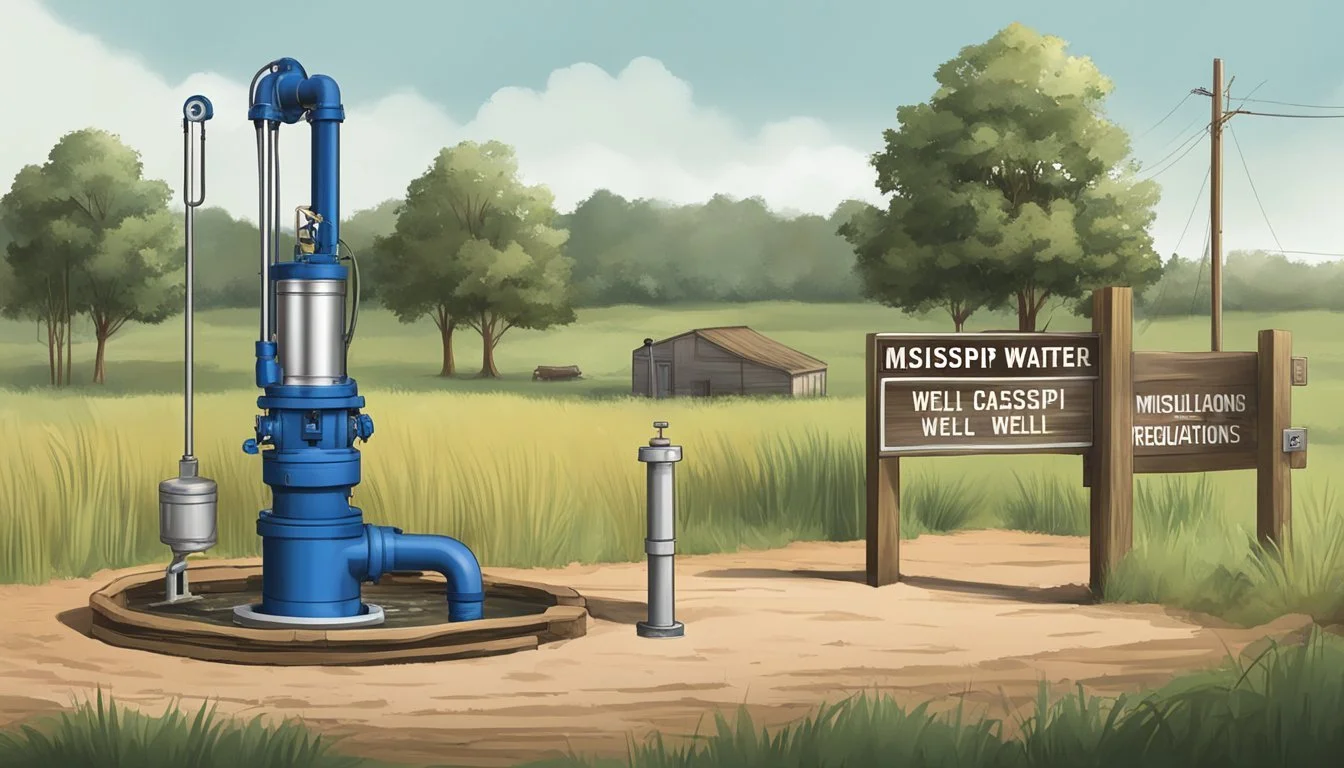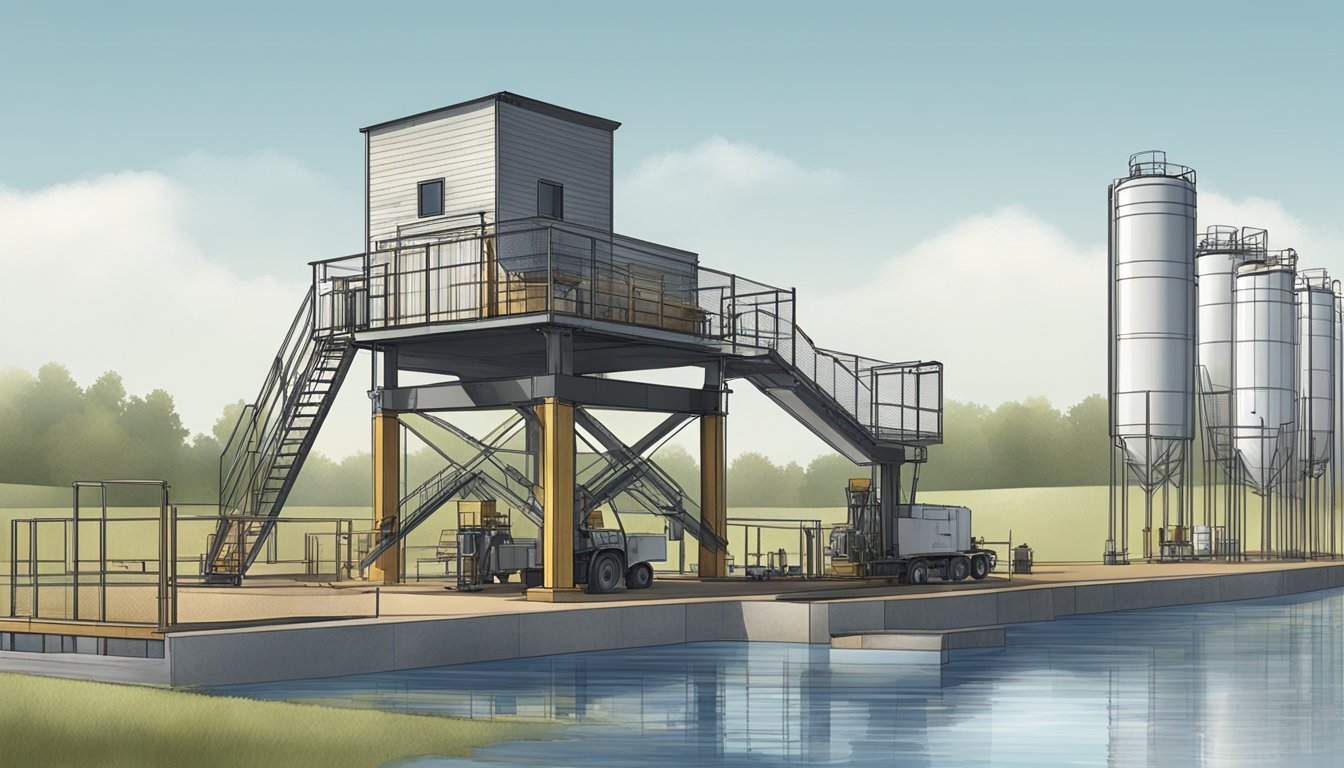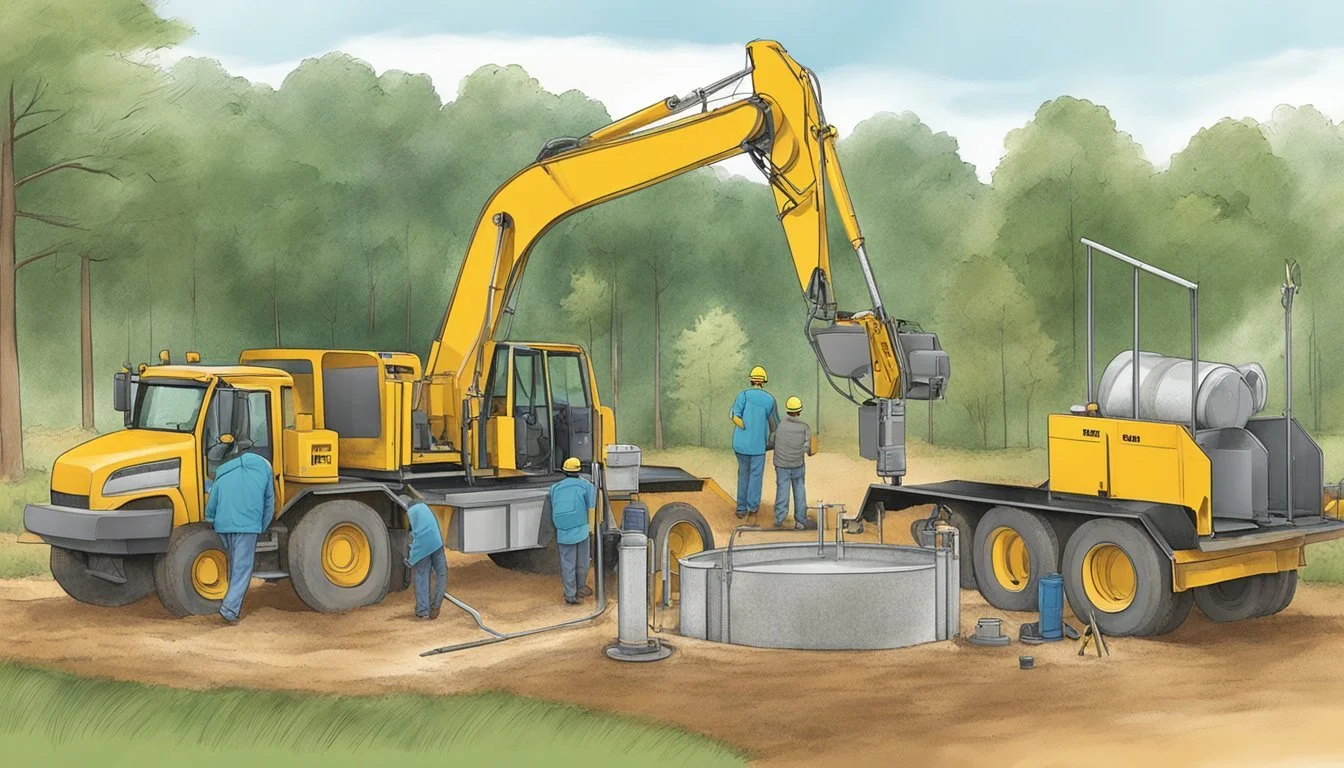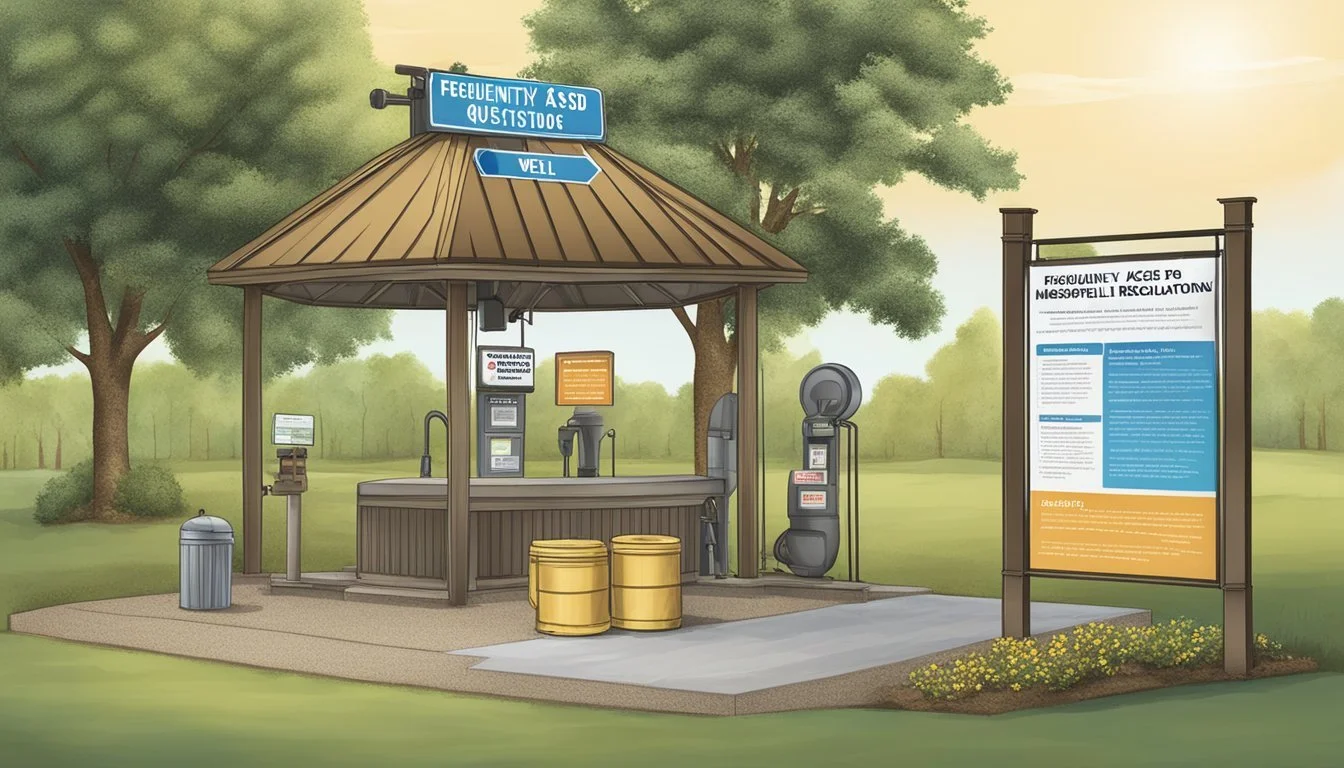Mississippi Water Well Regulations
A Comprehensive Guide to Compliance
Mississippi maintains specific regulations for the drilling and maintenance of water wells within the state to safeguard its precious groundwater resources. State laws require that any individual or company drilling a water well must be licensed in Mississippi. This ensures that wells are constructed in a manner that both provides safe drinking water and protects the groundwater from contamination. In line with this, the Mississippi Department of Environmental Quality (MDEQ) has laid out particular guidelines and requirements, and adherence to these regulations is mandatory for all water well drillers and pump installers.
Significant changes were made to these regulations as of March 24, 2011, which include a stipulation for water well drillers to obtain a minimum of four hours of continuing education annually. This educational component is meant to keep professionals informed of the latest methods, safety practices, and technological advancements in well drilling. Furthermore, individuals seeking to drill wells are required to be mindful of the groundwater permit guidance provided by MDEQ before initiating any drilling activities. This guidance includes essential details on application processes, appropriate fee submission, and necessary documentation to ensure compliance with state regulations.
Overall, the management of water wells in Mississippi is a coordinated effort designed to uphold the integrity of the state's water supply and ensure responsible water use. These efforts are instrumental in preventing the pollution of groundwater and helping to provide clean and safe drinking water to communities throughout Mississippi. For more detailed information on the regulations concerning water wells, including permit applications and guidelines for drillers, the MDEQ's website serves as a comprehensive resource.
Mississippi Water Well Regulations Overview
In Mississippi, water well regulations are established to protect and manage groundwater resources effectively. These regulations ensure the safe construction, maintenance, and operation of water wells across the state.
Legal Framework
The legal framework for water well regulations in Mississippi is grounded in state laws and administrative codes. The Mississippi Primary Drinking Water Regulations provide guidance on the minimum design criteria for public water systems, while specific rules for water well contractors are detailed within the administrative procedures act rules.
Title 11: Addresses the licensing of water well contractors.
Chapter 2: Covers detailed definitions, applicability, and minimum requirements related to water wells.
These rules include provisions such as:
Well construction standards
Permitting processes
Inspection requirements
Major Governing Bodies
The primary governing bodies overseeing water well regulations in Mississippi are the Mississippi State Department of Health (MSDH) and the Mississippi Department of Environmental Quality (MDEQ). These agencies are responsible for enforcing the regulations and ensuring compliance with state laws.
MSDH: Focuses on protecting public health and the state's drinking water.
Responsibilities include:
Issuing guidelines for water quality
Overseeing infrastructure grants for rural water associations
MDEQ: Concentrates on environmental aspects and the proper use of water resources.
Tasks involve:
Licensing water well contractors
Implementing rules regarding well construction and maintenance standards
Well Design and Construction Standards
The regulations for water well design and construction in Mississippi ensure the protection of groundwater sources and the delivery of safe, potable water. Adherence to these detailed construction codes, specific casing and completion requirements, as well as grouting and sealing processes, is essential for compliance with state health and environmental quality standards.
Construction Codes
The Mississippi State Department of Health provides comprehensive regulations that articulate the minimum design criteria for public water systems. Contractors must use standardized Equipment for drilling and construction, which complies with the current American Water Works Association Standards to prevent contamination of water reserves.
Well Casing and Completion
The integrity of a well's structure heavily depends on its Well Casing quality. Casing materials must meet approved standards to ensure they are free of contaminants and defects. A precise configuration of the well's system is mandatory, where the Design of the casing facilitates proper insertion into the ground and sustains the surrounding formations.
Grouting and Sealing
Grouting is the process of injecting a Cement-Bentonite Mixture or Neat Cement to seal the space between the well casing and the borehole, preventing surface contaminants from entering the aquifer. Cement Grout, a commonly used material, must be properly Grouted to establish a continuous seal along the casing for effective protection of groundwater.
Water Well Location and Permits
When establishing a water well in Mississippi, site selection and the permitting process play critical roles in sustainable water use and regulatory compliance. The regulations aim to protect aquifers and ensure proper use of groundwater resources.
Site Selection Criteria
Location impacts both the environmental sustainability of a water well and the legal permission to construct it. Well Location must meet specific criteria set forth by the Mississippi Department of Environmental Quality (MDEQ). These criteria take into account the proximity to contamination sources, existing structures, and the need to protect vital aquifers. Water Well Contractors are required to follow these criteria to ensure the selected site is appropriate and to minimize the environmental impact.
Proximity to contamination sources: The site must be a safe distance from potential hazards.
Consideration of existing structures: Placement should not negatively impact the surrounding infrastructure.
Aquifer protection: The well must not compromise the health of vital groundwater sources.
Water Use Permitting Process
To withdraw water using a water well, one must navigate the Water Use Permitting Process. This involves obtaining a Permit from MDEQ, which considers both the volume of Groundwater to be extracted and the proposed use. A Water Use Permit is required to legally extract groundwater, and the application process necessitates compliance with state regulations and often involves consultation with a licensed Water Well Contractor.
Permit application: Submit detailed plans for water extraction to MDEQ.
Volume and use evaluation: MDEQ reviews the potential impact on groundwater resources and existing water rights.
Compliance with MDEQ's Groundwater Permit Guidance ensures water wells are properly located and completed, providing benefits to the permit holder and protecting Mississippi's precious water resources.
Well Operation and Maintenance
In Mississippi, the operation and maintenance of water wells are critical for ensuring safe drinking water and safeguarding environmental quality. Proper routine monitoring and adherence to established maintenance procedures are essential to preserve the health of the public water supply and the integrity of groundwater resources.
Routine Monitoring
Regular monitoring is imperative for the maintenance of water well systems to ensure water quality and to protect against pollution. Mississippi regulations stipulate that public water wells must undergo routine inspections to detect any contaminants that could compromise drinking water standards. For instance, the Mississippi Department of Environmental Quality (MDEQ) provides guidelines on the frequency of inspections and the parameters that need to be tested during routine monitoring. This includes testing for bacteriological, chemical, and radiological contaminants to comply with the Ground Water Rule.
Maintenance Procedures
Maintenance procedures for water wells must be systematic and thorough. Maintenance activities include cleaning, repair, or replacement of well components that are vital for the ongoing provision of safe drinking water. The guidelines provided by MDEQ highlight the service criteria which may involve periodic disinfection, physical inspections, and mechanical integrity assessments. The Mississippi State Department of Health (MSDH) also emphasizes installation separation distances to reduce the risk of contaminant infiltration into wells, stating that a new well must be at least 50 feet from a septic tank and at least 100 feet from a drain field.
By following these protocols for well operation and maintenance, Mississippi aims to protect the health of its residents and maintain the environmental quality by preventing groundwater pollution and ensuring a safe public water supply.
Environmental Protection and Safety
Mississippi places strong emphasis on safeguarding its water resources, ensuring that both surface and groundwater are protected from hazardous contaminants. The state has established comprehensive regulations, enforced by entities such as the Mississippi Department of Environmental Quality, to prevent environmental degradation and to provide its residents with clean potable water.
Handling of Hazardous Materials
When hazardous materials are handled in Mississippi, stringent procedures are mandated by regulations to protect both environmental quality and safety. The Mississippi Commission on Environmental Quality stipulates clear guidelines that govern the storage, transportation, and disposal of hazardous substances to prevent soil and water contamination. For example, the handling of materials with high chloride concentrations, which could lead to a contaminated aquifer, is closely monitored with the goal of maintaining safe levels of total dissolved solids in groundwater.
Containment and Mitigation Strategies
To maintain the integrity of water-bearing strata, Mississippi's strategies for containment and mitigation include immediate response protocols for any contaminants that may breach environmental safeguards. The state's approach involves:
Immediate assessment of any reported contamination to evaluate potential risks to groundwater.
Deployment of containment systems such as physical barriers to prevent further migration of contaminants.
Implementation of remediation plans to restore contaminated soil or groundwater to its previous condition.
Monitoring of contaminated sites for levels of total dissolved solids and other critical indicators of environmental health.
These steps exemplify the preventive and responsive measures that ensure the residents of Mississippi have access to clean, safe potable water and that the natural environment is shielded from the adverse effects of waste and contaminants.
Special Purpose Well Specifics
In Mississippi, regulations for special purpose wells are meticulously devised to address the unique uses and the environmental impact associated with different types of well constructions. These guidelines ensure the responsible extraction and monitoring of groundwater resources.
Agricultural and Irrigation Wells
Agricultural and irrigation wells are critical for Mississippi's farming sector. Under the regulations, these wells must be constructed to avoid contamination and ensure efficient water use. Irrigation Wells in particular are designed to support water-intensive agricultural operations, and their construction must adhere to the state's codes on Brackish Water Withdrawal Wells where applicable, to protect the delicate balance of groundwater resources.
Industrial and Public Supply Wells
Wells that serve industrial facilities and public water systems have stringent specifications due to their large-scale impact. Industrial wells, including those used for Cathodic Protection Wells, are regulated to prevent any adverse effects on the surrounding ecosystem. Similarly, those supplying Public Water Systems must be reliably constructed to provide safe, Potable Water to communities, always with an unwavering emphasis on public health and safety.
Monitoring and Observation Wells
The construction and maintenance of Monitoring and Observation Wells are essential for environmental surveillance. These wells provide critical data on groundwater levels, quality, and potential contamination. Regulations for Monitoring Well Construction involve precise protocols to ensure accurate readings and to inform responsible water management decisions.
Private Domestic Wells
Private Wells are predominantly used for domestic purposes, supplying households with Potable Water. The state mandates that these wells are installed away from possible sources of pollution and are regularly tested to safeguard against contaminants. They must be constructed and maintained in accordance with local laws, ensuring a safe water supply for residents' daily needs.
Water Well Contractor Responsibilities
In Mississippi, water well contractors must adhere to strict regulations that ensure the safety and quality of water wells. They are responsible for meeting specific licensing requirements and maintaining accurate records.
Licensing and Training
Water well contractors in Mississippi must secure a license from the Mississippi Commission on Environmental Quality. The licensing process involves meeting minimum requirements, which include having adequate knowledge of well construction and an understanding of the state's water resources. Contractors are required to pass an examination that assesses their competency in various aspects of well construction, including design criteria and construction standards. Additionally, licensed contractors must engage in continuing education to stay informed of industry updates and regulatory changes.
To maintain a license, the licensee must also pay certain fees and renew their license regularly. Failure to comply with licensing requirements may result in penalties or loss of the contractor's ability to operate legally within the state.
For more detailed regulatory information on licensure, refer to the Mississippi Commission on Environmental Quality Licensing of Water Well Contractors Regulations.
Record Keeping
Proper record keeping is a critical responsibility for water well contractors. They are required to complete a driller's log for each well they construct, which contains detailed information on the well's construction and design features that meet design criteria and construction standards. A State Well Report, which includes the driller's log, must be submitted to the Mississippi Department of Environmental Quality (MDEQ) within 30 days after the completion of drilling.
These records provide transparency and ensure that wells are constructed to safe and professional standards. They also serve as an official account of the contractor's work and are important for both regulatory compliance and historical reference.
Explore more about the requirements for water well design criteria and construction by reviewing the Design Criteria And Construction Standards and for the rule concerning state well reports at State Well Reports.
Impact on Groundwater Resources
Mississippi's reliance on groundwater for its potable water supply necessitates rigorous assessment and protection of its aquifers. These efforts ensure that both the quantity and quality of the groundwater are maintained for public supply and private well owners.
Assessment of Groundwater Recharge
Groundwater recharge in Mississippi is a critical process that replenishes aquifers, supporting the state's extensive use of groundwater resources. Studies, such as the one detailed in the state's Groundwater Quality Assessment, provide data on the volume of water entering the aquifers and the rate at which this occurs. Recharge generally happens in designated recharge areas, where water from precipitation and surface sources percolates into the ground.
Recharge Rate: Influenced by regional climate, soil type, and land use.
Recharge Areas: Identified to be critical for maintaining aquifer levels.
Proper identification and management of these regions are essential for avoiding over-extraction, which can lead to a decrease in water quality and supply.
Protection of Aquifers
Mississippi's aquifers, the natural storage spaces for groundwater, require ongoing protection from contamination to ensure that the water remains safe for consumption. The Groundwater Assessment and Remediation Division of Mississippi is tasked with this safeguarding, which includes:
Preventing bacteria growth: Ensuring contaminants from sewage and septic systems do not infiltrate the water supply.
Regulatory compliance by well owners: Establishing guidelines to protect against pollution and overuse.
Regular monitoring and clean-up initiatives are crucial for preventing any activity that could harm aquifers and compromise the state's potable water quality. The collaboration between private well owners and public bodies enhances the overall management and protection of Mississippi's groundwater resources.
Frequently Asked Questions
Understanding Mississippi's water well regulations is crucial for maintaining public health and environmental safety. Here, we address some key concerns surrounding these regulations.
What are the licensing requirements for well drillers in Mississippi?
In Mississippi, any individual responsible for drilling water wells must be licensed by the state. These licensing requirements ensure that well drillers are proficient in the latest safety and environmental standards for water well construction.
What are the minimum distance requirements for placing a well near septic tanks or other potential contamination sources in Mississippi?
Wells must be installed at least 50 feet from a septic tank and 100 feet from a septic system drain field in Mississippi. These are the minimum requirements, but greater distances are encouraged to further reduce any risk of contamination.
What are the standards for water well construction and maintenance in Mississippi?
The state of Mississippi provides guidelines and regulations that outline the minimum design criteria for public water systems to ensure the quality and safety of drinking water. Regular maintenance in compliance with these standards is vital for the longevity and safety of the water wells.
How often must water wells be inspected in Mississippi?
Mississippi does not specify a routine inspection schedule for private water wells, but it is recommended that well owners conduct annual inspections to assess the operational performance and water quality, along with checking for any potential mechanical problems.
What is the procedure for abandonment and plugging of unused wells in Mississippi?
Proper procedures for the abandonment and plugging of unused wells are in place to prevent contamination of groundwater. These procedures outline the materials and methods that are acceptable for use in plugging different types of wells.
What are the reporting and record-keeping requirements for well installation in Mississippi?
Well installers are required to keep detailed records of well installation and to submit a well report to the Mississippi Department of Environmental Quality. This report includes information on the well's location, construction details, and water yield.










